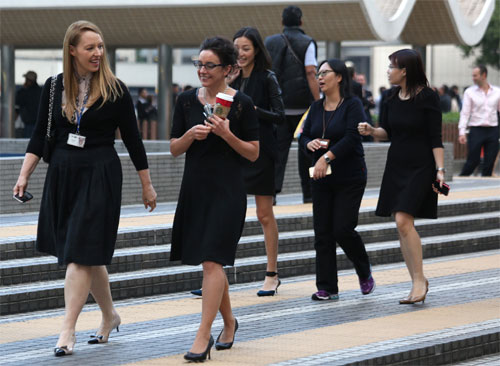Work-life concerns show we have come a long way
Updated: 2015-10-30 09:19
By Peter Liang(HK Edition)
|
|||||||
The results of a University of Hong Kong survey show that work-life balance has deteriorated in the past 10 years because of an increasingly competitive business environment and pressing demands from employers.
The survey of more than 1,000 employees in many different sectors of the economy was commissioned by Community Business, a non-profit group advocating responsible business practices in Asia. More than 60 percent of respondents to the survey said they felt their work-life balance had worsened since 2005.
Community Business chief executive officer Fern Ngai was quoted as saying that the negative sentiment of the majority of respondents could be traced to the "fallout from the 2008 global financial crisis and increased competition among companies in Hong Kong. "Everybody is under a lot of pressure," she said.
But it is hard to find a time since the economy began to take off in the late 1970s when Hong Kong people weren't working under a lot of pressure. In fact, Hong Kong people have gained a reputation for, among other things, working hard to achieve impossible targets even before some of those respondents to the survey were born.
This concept of a work-life balance is alien to Hong Kong. It is only in recent years that it has gained recognition among the younger generation of workers in this capitalistic enclave.
To the majority of Hong Kong people, work-life balance has remained a vague concept. Even those who have embraced the idea are at a loss as to where to draw the line.
In Scandinavian countries where the population is small and the land is rich in natural and other resources, employees have successfully fought for benefits, including plenty of leisure time with families, which are the envy of people in many other countries, including those in highly developed economies like the United States and Japan.
Hong Kong is unique among developed economies. It has no resources other than its people and they knew a long time ago that nobody owes them a living. They have to earn it primarily with hard work.
Ngai made special mention of the hardship of people working at banks. She didn't mention that those "overworked" bankers also make a lot of money. It's another kind of balance that they settled for consciously. There are other less-well-paying jobs they can choose if they want more time for themselves and their families.
In a free-market economy like Hong Kong where government intervention is viewed with suspicion, every employee will have to make a personal judgment on where to draw the line. Hong Kong has gone through many changes in the 10 years since 2005 when it began to emerge from the devastation of the recession triggered by the Asian financial crisis. At that time, most employees were worried about their jobs and the dwindling value of their assets.
The fact that some employees are beginning to be concerned about work-life balance shows how far the economy has improved, and that's a good thing.
|
Striking a balance: Office workers taking a break during the day in Central. Parker zheng / China Daily |
(HK Edition 10/30/2015 page7)
